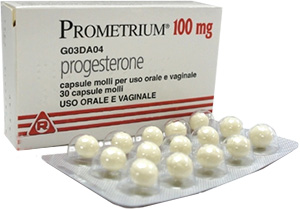Medication Overview
Prometrium is a prescription medication that contains the active ingredient progesterone. It is used primarily in hormone replacement therapy and is critical for regulating menstruation and ovulation in women. Prometrium is often recommended for those who have an irregular menstrual cycle due to progesterone deficiency. In some cases, it is used to prevent endometrial hyperplasia in postmenopausal women who are receiving estrogen therapy.
Composition Details
Prometrium contains progesterone, which is identical to the hormone produced by the ovaries. The capsule form includes inactive ingredients such as peanut oil, gelatin, glycerin, and titanium dioxide. Patients with specific allergies should consult healthcare providers regarding these excipients. The formulation aims to deliver the hormone effectively to the bloodstream when taken orally, ensuring its efficacy.
Mechanism of Action
Progesterone in Prometrium works by mimicking naturally occurring hormones, thus maintaining hormonal balance. It prepares the uterine lining for implantation of a fertilized egg and supports early pregnancy. In non-pregnant women, it helps regulate the menstrual cycle by stabilizing the endometrial lining and reducing abnormal bleeding.
Indications for Use
Prometrium is indicated for use in women who suffer from secondary amenorrhea, which is the absence of menstruation not related to menopause. It is also prescribed to prevent endometrial hyperplasia when used in combination with estrogen therapy in postmenopausal women. Moreover, Prometrium is crucial in hormone replacement therapy protocols.
Dosage and Administration
The typical dosage of Prometrium varies based on the condition being treated. For instance, in secondary amenorrhea, a common regimen might involve 400 mg taken once in the evening for 10 days. In hormone replacement therapy, a dose of 200 mg may be taken once daily at bedtime for 12 consecutive days. It’s essential to follow specific instructions provided by healthcare providers, as adjustment is based on individual responses.
Pharmacokinetics Insights
After oral administration of Prometrium, the drug undergoes rapid absorption, achieving peak plasma concentrations approximately 3 hours post-dosing. Prometrium is metabolized in the liver into numerous metabolites, with its half-life ranging from several hours to a day. Due to its lipophilicity, a meal high in fat may enhance its absorption, altering the expected pharmacokinetic profile.
Potential Side Effects
Common side effects of Prometrium include dizziness, abdominal pain, headache, and breast tenderness. Patients may also experience mood swings and bloating. Certain severe but rarer effects involve deep venous thrombosis and liver dysfunction. Monitoring for adverse reactions is important, and individuals should communicate any concerns to their healthcare professional.
Drug Interactions Overview
Prometrium can interact with a variety of medications, altering its effectiveness or increasing side-effect risks. Enzyme inducers like phenobarbital or carbamazepine may lower serum progesterone levels, while enzyme inhibitors such as ketoconazole may increase its levels. The interaction with anticoagulants must be evaluated closely to avoid bleeding complications.
Contraindications Considerations
Prometrium is contraindicated in individuals with known hypersensitivity to progesterone or any of its formulation constituents. It’s also not suitable for patients with undiagnosed vaginal bleeding, liver dysfunction, or a history of thromboembolic disorders. Pregnant women should only use the medication when explicitly advised by a healthcare professional.
Laboratory Test Interference
Prometrium may affect laboratory test results, including hepatic function and coagulation panels. Its use may also influence thyroid tests, particularly binding assays, due to hormone interaction. Patients should inform laboratories about Prometrium use to ensure accurate diagnostic interpretation results.
Use in Special Populations
In elderly populations, dosage adjustment may be necessary depending on hepatic, renal, and cardiac function. Prometrium’s use in prepubescent children is not normally indicated, and careful assessment is required for adolescent females. Lactating women should discuss the potential effects on breastfeeding infants, as progesterone can pass into breast milk.
Monitoring and Follow-up
Patients using Prometrium should undergo regular monitoring for treatment efficacy and any side effects. Particular attention is required for endometrial assessment in long-term hormone replacement therapy. Regular clinical evaluations allow adjustments in the regimen to optimize therapeutic outcomes.








Reviews
There are no reviews yet.